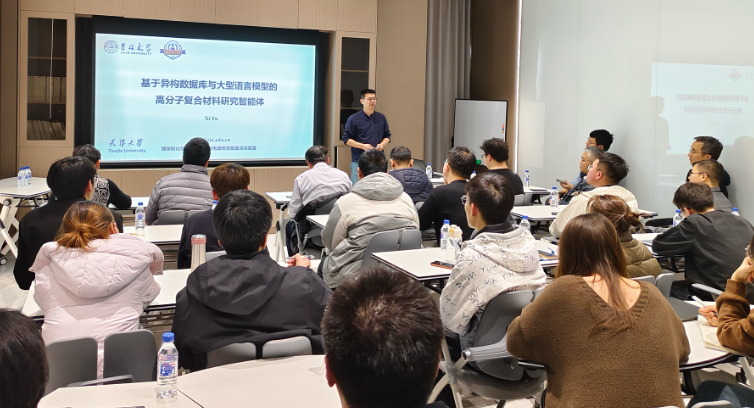AI Empowering Materials Science: Dr Yu Xi Shares New Intelligent Approaches for Polymer Composite Research

On March 28, 2025, Dr Yu Xi from Tianjin University was invited to visit our institute and delivered a compelling academic lecture titled “Intelligent Agents for Polymer Composite Research Based on Heterogeneous Databases and Large Language Models.” The report explored the integration of artificial intelligence (AI) with materials science, drawing great interest from faculty and students.
Yu Xi earned his bachelor’s and master’s degrees in chemistry from Jilin University under the supervision of Xi Zhang. He then pursued his Ph.D. at the University of Massachusetts Amherst, working with Vincent M. Rotello. After completing his doctoral studies, he joined the Weizmann Institute of Science in Israel, where he focused on molecular electronics and the interactions between charge transfer and molecular vibrations. Currently, he works in the Department of Chemistry at Tianjin University, where he combines experimental research with theoretical calculations to explore the fundamental processes of charge transfer.
In recent years, large language models (LLMs) such as ChatGPT and Deepseek have gained significant attention, raising the question of how to effectively leverage these emerging technologies across various disciplines. In his presentation, Yu Xi and his research team shared their innovative approach: by extracting and structuring data from over 3,000 research papers in the field of polymer composites, they developed a heterogeneous database incorporating descriptors from natural language, programming languages, and data tables. This significantly enhanced the structural representation of data and served as the foundation for training a domain-specific large language model tailored for polymer materials science. The resulting model demonstrated unparalleled professional competence compared to existing counterparts, achieving remarkable improvements in accuracy and logical reasoning in domain-specific question-answering tasks. This work highlights AI’s vast potential in chemical research.
The lecture sparked intense interest among attendees. During the Q&A session, students and faculty engaged in lively discussions on the training methodology, practical applications, and future prospects of AI in chemistry. The atmosphere was filled with enthusiasm as participants envisioned how AI technology could further advance materials science and the broader field of chemistry.
Science and technology are the driving forces of human progress. Yu Xi’s visit not only showcased cutting-edge advancements in AI-driven chemistry but also expanded the academic perspectives of students and faculty. His insights provided valuable inspiration for future research. We look forward to more opportunities for academic exchange, fostering discussions on the future of chemical research in the era of intelligent technology.
(Drafted by Zhaolin Zhu,reviewed by Guanglu)